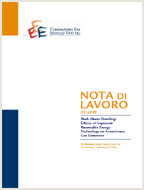Environmental Research Joint Ventures and Time-Consistent Emission Tax

25.03.2014
Yasunori Ouchida, Daisaku Goto
O32, L13, Q55, Q58
Environmental Research Joint Venture, Environmental R&D, Time-consistent Emission Tax, Competition Policy, Cournot Duopoly
Climate Change and Sustainable Development
Carlo Carraro
This paper presents an examination of the socially efficient formation of environmental R&D in Cournot duopoly in a setting where a regulator has no precommitment ability for an emission tax. The results reveal that if the environmental damage is slight, alternatively, given severe environmental damage and large inefficiency in environmental R&D costs, then environmental research joint venture (ERJV) cartelization is socially efficient. However, if environmental damage is severe, and if a firm’s R&D costs are limited, then, in stark contrast to results of previous studies, environmental R&D competition is socially more efficient than the other three scenarios (i.e., environmental R&D cartelization, ERJV competition, and ERJV cartelization), although R&D competition is the case of “NO information sharing and NO R&D coordination.”
***
Suggested citation: Ouchida,Y. and Goto, D. (2016) Environmental research joint ventures and time-consistent emission tax: Endogenous choice of R&D formation, Economic Modelling, Vol.55, pp.179-188 (doi: 10.1016/j.econmod.2016.01.025)
